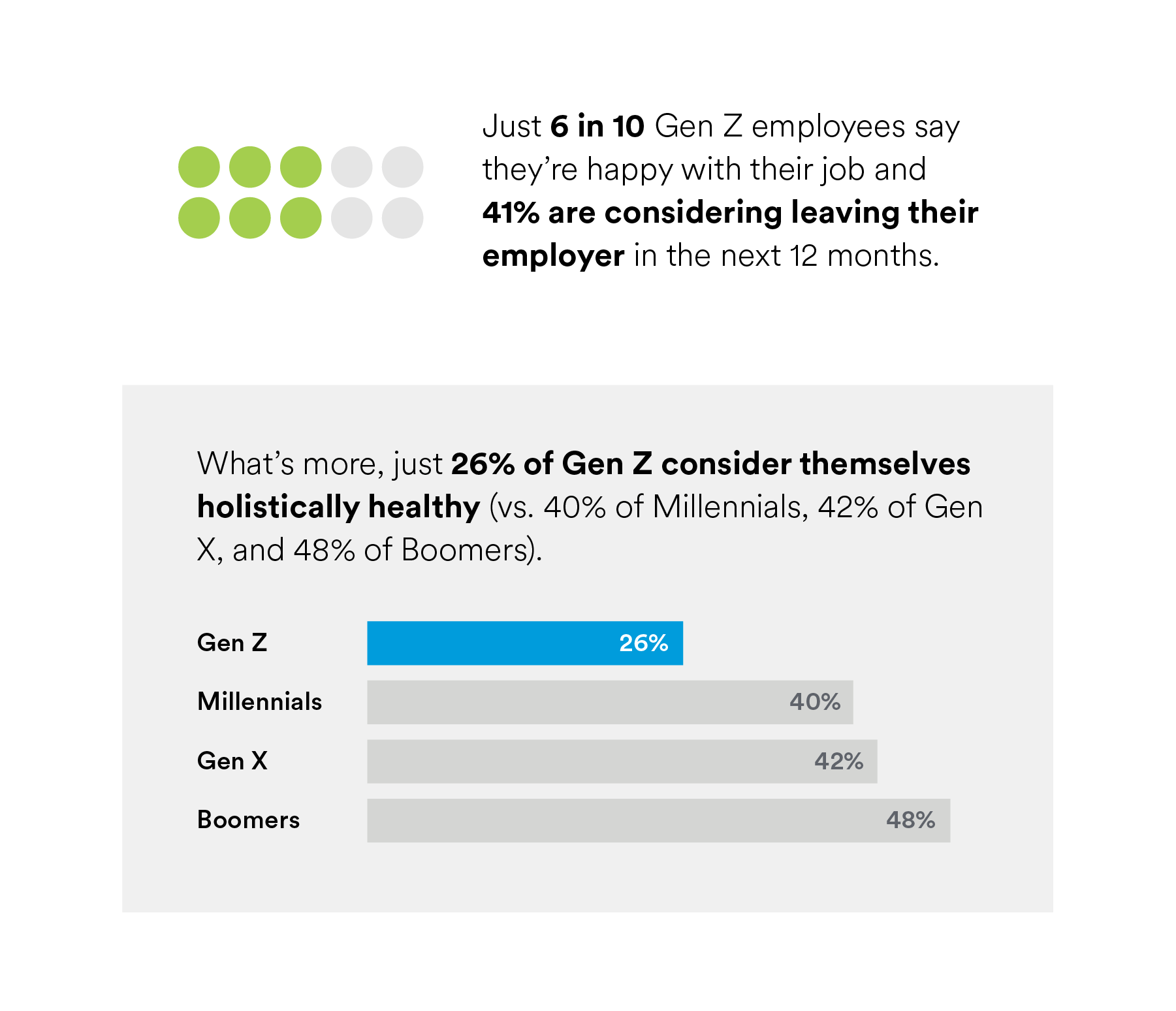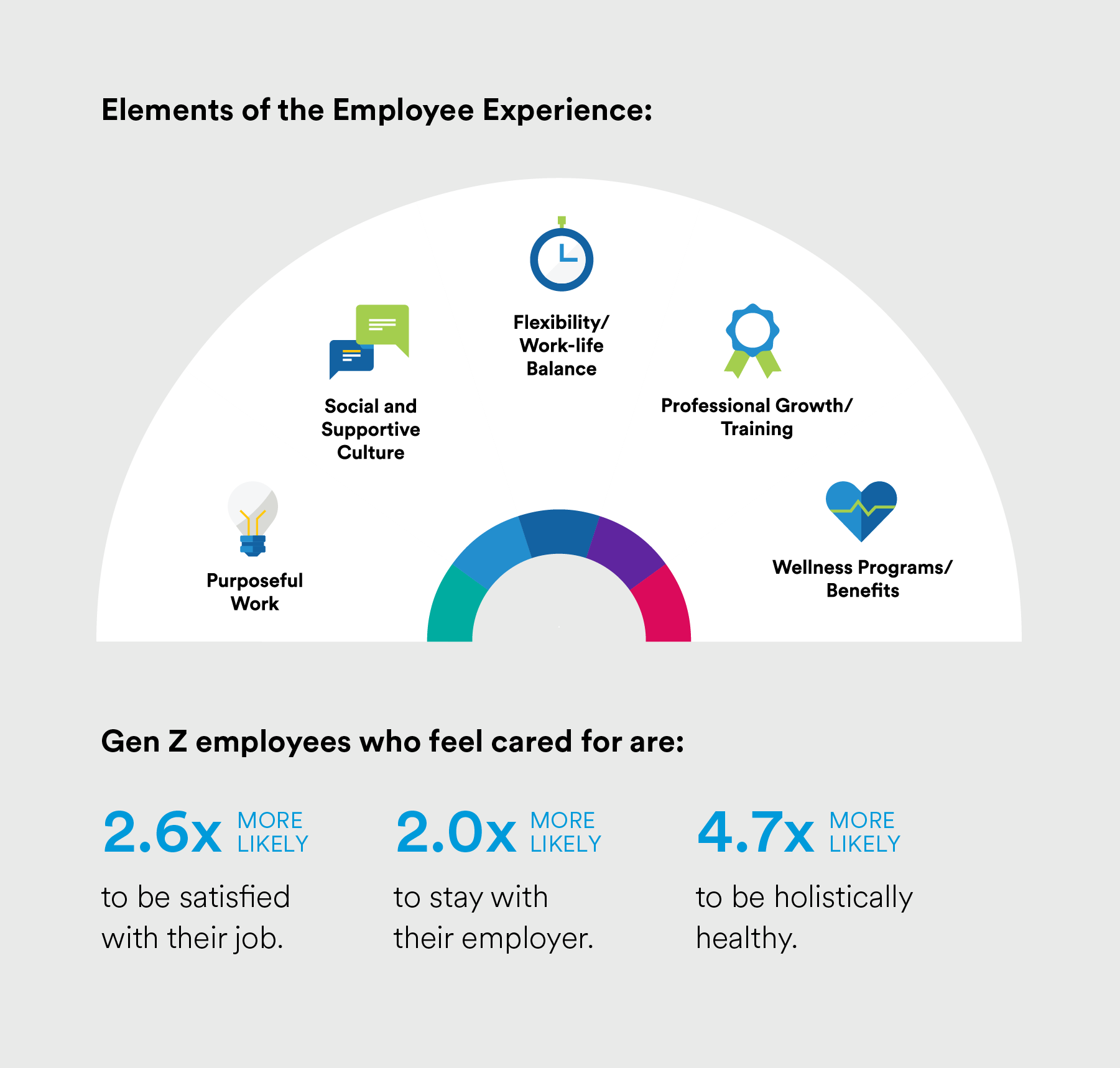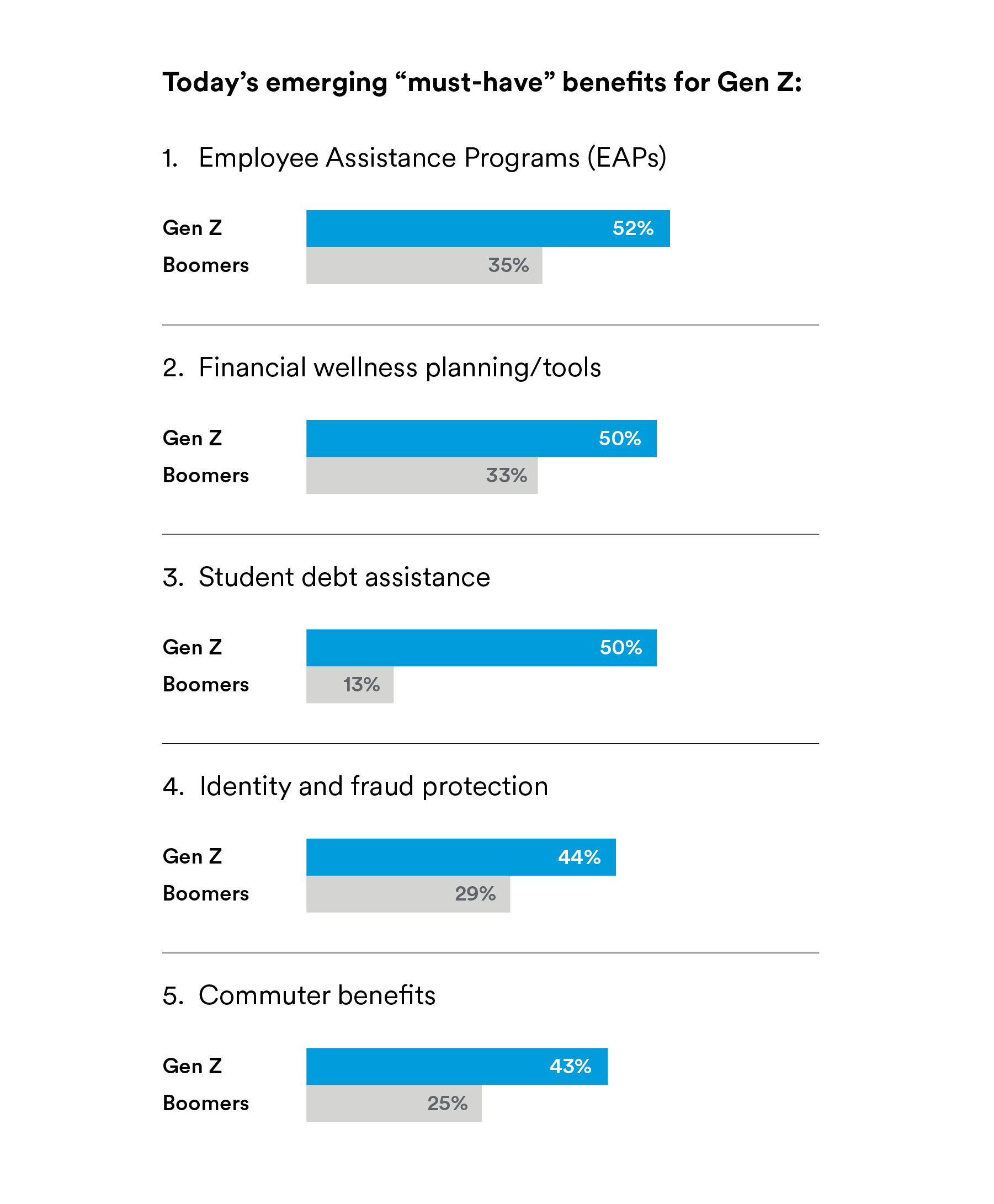The Whole Employee
Caring for Gen Z: how employers can prepare for the workforce of tomorrow
Key takeaways
- Employers face an unprecedented talent crisis, marked by all-time low satisfaction and loyalty among Gen Z employees.
- Employee care can help reverse these trends and improve Gen Z's well-being.
- Efforts to demonstrate care must focus on strengthening the workplace culture, as well as expanding access to a broader range of benefits and programs.
In the wake of the Great Reshuffle, employers now face the trend toward “quiet quitting” and “acting your wage," with the youngest workers leading the charge.
Gen Z employees, who now make up 10% of the workforce, are the age group most disillusioned with work. Job satisfaction among this cohort has fallen a staggering 17% since 2019, and remains 10% lower than every other age group in the workforce.
As Gen Z becomes an ever-increasing share of the workforce, these troubling data points hint at the crisis employers will face if these trends are left unchecked. However, our research has identified an opportunity for employers to intervene by demonstrating employee care.
Demonstrating care requires supporting workers across the employee experience. Together, the five essential elements of the employee experience, plus compensation, which is foundational, work synergistically to improve employees’ well-being — and, ultimately, bolster job satisfaction and retention.
However, effectively caring for Gen Z requires a deep understanding of the struggles this diverse cohort faces today — and the unique expectations this generation has of their employers. Here, we will delve into the aspects of care that matter most to Gen Z, and five strategies employers can use to deliver care across the employee experience.
1. Lead with your core values, and put inclusion first
For the most diverse generation, an employer who does the right thing is not simply a “nice to have” that enhances the employee experience — it’s a core component of care. Just over half (51%) of Gen Z say Diversity, Equity, and Inclusion (DEI) programs are must-haves to feel cared for, and they’re also looking for employers to take a stand on social and environmental issues.
Employers can adapt to these growing needs by crystallizing their core values, including their stances on sustainability, social issues, and commitment to inclusion, and clearly communicating these values in internal and external communications.
Crucially, these efforts must be backed by action, including rolling out DEI programs that meet employees’ needs and taking steps to reduce negative environmental impact across the organization.
2. Cultivate a supportive culture with a clear sense of purpose
A compelling and supportive culture is a central aspect of employee care — one that is especially important to Gen Z.
Compared to employees across all age groups, Gen Z is 10% more likely to say a supportive and empathetic culture is a “must-have” for employee care, and they’re also 16% more likely to seek out organizations with a positive company purpose.
Employers can cultivate a culture of support by training managers to recognize employees’ hard work and acknowledge the team’s contribution to the organization’s mission as a whole. Organizations should also look for opportunities to help team members focus on the most meaningful work — for example, by investing in technology that automates tedious tasks — to instill a sense of purpose for all employees, including Gen Z.
3. Create paths to advancement to form long-term relationships
The youngest generation is also the most forward-looking, and career advancement is top of mind when it comes to employee care.
Half of Gen Z employees say training and upskilling initiatives are “must-haves” for demonstrating care, and they also want more opportunities to build professional relationships inside and outside of work.
Organizations should meet these needs by highlighting opportunities for career advancement at each stage of the employee experience, including during candidate recruitment and evaluation. Employers can train managers to ask employees about their career aspirations and invest in mentorship programs that help Gen Z employees form the relationships they’ll need to develop. Finally, they can encourage managers to suggest opportunities for younger talent to learn new skills, including opportunities for horizontal and vertical growth.
4. Embrace emerging benefits and address affordability
Benefits play a central role in the employee experience. And Gen Z, in particular, finds their employers' offerings falling short. Benefits satisfaction is markedly lower among Gen Z than across other generations — roughly 10% lower than Millennials, Gen X, and Boomers — contributing to a downward trend in benefits satisfaction overall.
This trend may stem from Gen Z’s heightened expectations of their employers. The innovative benefits of today are becoming the must-have benefits of tomorrow, and the youngest generation is more likely to see emerging benefits as essential to employee care.
Employers can also stand out by offering more paid and unpaid leave to help employees manage their personal and professional lives. Nearly six in 10 Gen Z employees say they are interested in extended paid leave or sabbatical, compared to 54% of employees overall.
Finally, employers can set themselves apart by addressing employees’ out-of-pocket expenses. Six in 10 Gen Z employees identify access to affordable benefits as a must-have aspect of employee care. Paying for a larger proportion of employees’ coverage or choosing benefits with lower out-of-pocket expenses helps ensure employees can access their benefits — and, therefore, maximize the positive impact wellness benefits have on well-being.
5. Tailor benefits communications to Gen Z's needs
When asked to identify the features of their benefits programs that cause them to feel cared for by their employer, more than half of Gen Z employees said they wanted benefits and programs that were easy to understand and simple to access. Benefits communications play a central role in demonstrating care, then, by helping employees make sense of their options.
As a baseline, communications should use plain, straightforward language to explain what each benefit covers, as well as how to enroll. But the most effective communications will go a step farther, highlighting the real-world impact of benefits and programs on employees’ goals — for example, how financial wellness planning benefits can help employees pay down their student loans.
Lastly, employers should demonstrate care by meeting employees where they are. Distribute benefits communications across channels preferred by Gen Z, including social media and video, to help young employees make the most of the benefits and programs available to them.
Care for Gen Z today to safeguard your talent tomorrow
Gen Z’s representation in the workplace will double in the next five years, and employers must take steps to prepare for this changing of the guard. Taking steps to demonstrate care can help bolster well-being, satisfaction, and loyalty among young talent.
Left uninterrupted, Gen Z’s low satisfaction and loyalty rates stand to create an unprecedented talent management crisis — one employers may be able to prevent by demonstrating employee care.


